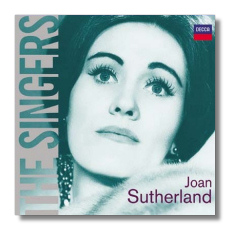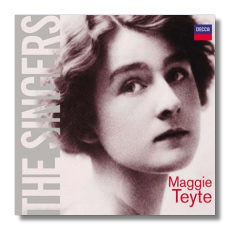
The Internet's Premier Classical Music Source
Related Links
- Latest Reviews
- More Reviews
-
By Composer
-
Collections
DVD & Blu-ray
Books
Concert Reviews
Articles/Interviews
Software
Audio
Search Amazon
Recommended Links
Site News
 CD Review
CD Review
The Singers

Joan Sutherland
- Arias from Lucia di Lammermoor, Tannhäuser, Lohengrin
- Wolfgang Mozart: Vorrei spiegarvi, oh Dio!
- Songs by Rossini, David, Gounod, Massenet, Hahn, La Forge, Del Riego, Coward, and Adam
Joan Sutherland, soprano
Various accompaniments
Decca 467914-2 ADD 69:05


Maggue Teyte
- Arias from La Périchole, Véronique, Sir Roger de Coverley, The Student Prince, The Lilac Domino, Conversation Piece
- Songs by Fauré, Hahn, Dvořák, Schumann, Brahms, Quilter, Delius, Gibbs, Bridge, Webber and Peel
Maggie Teyte, soprano
Various accompaniments
Decca 467916-2 ADD monaural 63:42
Decca's growing "The Singers" series, dedicated to the late writer John Ardoin, is aimed straight at collectors who love the human voice. It helps if they own a computer, too. When popped into a PC or Macintosh, the disc yields a photo gallery, a discography, and a "profile" for each singer, plus and texts and translations of the sung material. Does this mean that we are supposed to be sitting at our computers even as we enjoy music now? I hope not.
The initial releases in this series made me wonder whether more attention had been paid to presentation than to the music and the recordings themselves. With the Joan Sutherland CD, the suspicion persists. Starting the disc with "Regnava nel silencio" makes perfect sense, as Lucia di Lammermoor was one of Sutherland's signature roles. Unfortunately, the only other operatic excerpts on this disc are "Dich, teure Halle" from Tannhäuser and "Einsam in trüben Tagen" from Lohengrin. Suffice it to say that "La Stupenda" was not a Wagnerian soprano by any stretch of the imagination, and that the inclusion of these two arias adds curiosity value to the disc, but little more. Her indistinct consonants conspire against her and make her a singularly ineffective interpreter of German roles. And no Verdi? No Bellini? Not even a bit of her Turandot or Marie (La Fille du regiment)? Incredible! The Mozart concert aria is lovely, but Beverly Sills – as can be heard on her "Singers" disc – makes Sutherland sound like she has a mouth full of Linzer torte. The songs by Rossini, David, and Gounod catch Sutherland late in her career, when her voice had taken on a pronounced beat. The Hahn, La Forge, Del Riego, and Coward numbers include some first-class singing, but Douglas Gamley's arrangements are like so much pancake syrup. Gamley's talents are put to better use in arrangements of Adam's "O holy night" and Gounod's "O divine redeemer." Here, Sutherland is stupendous indeed. These two closing numbers may be enough to tip the scales in favor of this CD, even though it is not at all representative of the soprano's career. This is distinctly a "Sutherland odds and ends" disc.
Sutherland discs are thick on the ground, but you won't find many Maggie Teyte reissues out there, and so this new Decca CD really fills a need. I don't know why her work is so rare today; perhaps it's because "French" sopranos (yes I know, Teyte was English) aren't as valued as they were decades ago.
These recordings were made in 1932 and 1937, when Teyte was in her mid- to late 40s. The first selection on this disc is "Tu n'es pas beau" from Offenbach's operetta La Périchole, and has anyone else sung it with such a perfect mixture of sexiness and humor? Teyte was a quintessential artist in French material, as is also shown by two arias from Messager's Véronique and Après un rêve by Fauré. (She was engaged to sing at the Opéra-Comique in Paris before she was even out of her teens.) She was no less excellent, however, in English and German art songs, and in other light operas. "Deep in my heart dear" from Sigmund Romberg's The Student Prince is heart-breaking, and "I'll follow my secret heart" from Noël Coward's Conversation Piece is painfully wistful. At this point in her career, Teyte's voice was secure, but a fragile sadness could unexpectedly appear in the middle of a word. Her singing was intimate, her understanding and projection of texts (whatever the language) of an instinctive naturalness, and her ability to modulate tone color and dynamics at will astonishing.
The remasterings from the 78-rpm records are uncredited – maybe the individual responsible is named on the CD-ROM portion of the program. They don't hide the surface noise, but nothing has been taken from Teyte's voice. And that's a good thing, because this disc is a genuine discovery.
Copyright © 2002, Raymond Tuttle


















